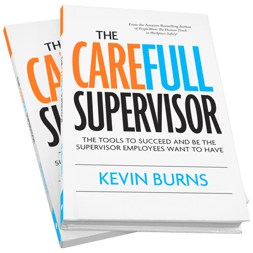Safety people and supervisors who lack a healthy dose of willingness to engage crew members on a human level will limit both themselves and their crews.
 Safety people and supervisors who lack a healthy dose of willingness to engage crew members on a human level will limit both themselves and their crews. It doesn’t happen on purpose, but it happens. The inexperienced supervisor who doesn’t know how to motivate and develop individuals on the job, ultimately has a harder time getting the job done. If there is no strategy to continuously improve employees, there’s little chance of improving the organization as a whole, and that includes safety.
Safety people and supervisors who lack a healthy dose of willingness to engage crew members on a human level will limit both themselves and their crews. It doesn’t happen on purpose, but it happens. The inexperienced supervisor who doesn’t know how to motivate and develop individuals on the job, ultimately has a harder time getting the job done. If there is no strategy to continuously improve employees, there’s little chance of improving the organization as a whole, and that includes safety.
In a perfect world, processes and procedures are definable and repeatable. But when you throw in the human element, process and procedure don’t always work. People are the most difficult variable to control. It is therefore vital that the human element carries more weight in safety discussions, planning, and protocols. Supervisors and safety people, however, continue to focus on enforcing process and procedure while ignoring the people involved.
How do you as a supervisor or safety person begin to integrate the human factor? Here are the first three areas to set your sights:
1Stop viewing employees as replaceable cogs in a machine. Every crew member should be valued as a person first. Holding the job over their heads as a threat is not a way to tell them that they're doing a good job. It is things like this that, for an employee, can turn a career into a dead-end job. People know when they aren’t being valued, and it reflects in their work. If all you are trying to do is to get a bunch of guys to achieve the bare minimum in safety, then you're focused on inimums, not potential. Minimum standards in safety breed minimum standards in morale. If the focus is on achieving minimums, staff will only be inclined to do the minimum required to not get fired.
2Make safety more about people and less about process. While we accept that the processes of safety are measured, the value that people bring to the job is not. But it should be. Safety, by and large, is designed to keep people safe. But how is it that people begin to feel like they matter when the focus of safety is about process? To value your people, each member of your crew should be appreciated for their unique contribution to the team. If you have a hard time appreciating people, you are likely in the wrong job. A company’s safety standards and processes need to support people at the human level. After all, it is people that we are trying to protect. The focus needs to go back to people being more important. Use process to protect people. Make the safety of your people your primary focus.
3Genuinely appreciate your people for the good work they do. The key word here is "genuinely." This is the way to win hearts and minds and build successful companies. When people feel genuinely appreciated and valued, they have reason to feel proud of their work. When they know that their employer stands by them and is willing to go the extra mile to ensure their safety, they’ll go the extra mile on the job. They will take both their work and safety to heart. People who feel appreciated tend to take more pride in the work they do. Make them proud of the work they do and the people they do it with and they’re going to want to protect that pride. Embracing safety is the best way to protect one's pride and quality of work.
A frontline supervisor who truly cares about his crew will work toward getting each crew member to buy into the safety program and a healthy lifestyle. That’s where the foundation of a strong safety culture starts. A smart supervisor leads by example, talks things out and initiates the kinds of conversations that positively influence employees to take safety to heart and mind.
 The choice is either to police your people into compliance or to contribute to a culture of safety that wins their hearts and minds. People don’t like being policed. No one does, but people do like being appreciated. As a motivational tool, hitting frontline workers over the head with a rulebook doesn’t work. In fact, it takes much less effort to let them know they’re appreciated. It’s much easier to get employees to buy into a safety program when it’s accompanied by real concern for individuals.
The choice is either to police your people into compliance or to contribute to a culture of safety that wins their hearts and minds. People don’t like being policed. No one does, but people do like being appreciated. As a motivational tool, hitting frontline workers over the head with a rulebook doesn’t work. In fact, it takes much less effort to let them know they’re appreciated. It’s much easier to get employees to buy into a safety program when it’s accompanied by real concern for individuals.
People who feel appreciated have the tendency to want to stick around. Turnover and attrition drop in company cultures of appreciation. Loyalty to the employer rises. When people have loyalty, they have ownership. When you build loyalty, you reduce turnover.
Never will your best day, the day in which you are most proud, be a day where you shortcut safety.
For more ideas and strategies for improving your ability to connect with your people to improve your safety performance, pick up my book, PeopleWork: The Human Touch in Workplace Safety.
Kevin Burns has authored ten books on human performance and safety, including his most recent release, PeopleWork - The Human Touch in Workplace Safety. Buy it now on Amazon. Then, consider bringing Kevin's consulting expertise to your company or have him speak at a safety event.
©2017 ZeroSpeak Corporation and Kevin Burns.
No part of this post may be reproduced without the expressed consent of the author.


